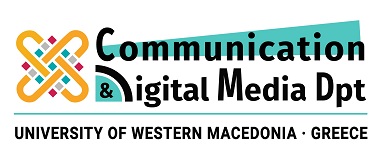CDM JMO3 EMERGING TECHNOLOGIES IN CRISIS COMMUNICATION
LEVEL OF STUDY: UNDERGRADUATE
COURSE UNIT CODE: CDM JMO3
SEMESTER: 8th
COURSE TITLE: EMERGING TECHNOLOGIES IN CRISIS COMMUNICATION
TEACHING WEEKLY HOURS: 3 H/W LECTURES
ECTS: 5
COURSE TYPE: OPTIONAL
TEACHING AND EXAM LANGUAGE: GREEK
COURSE DELIVERY TO ERASMUS STUDENTS: YES (in English)
This course will address the role of new technologies in crisis management and communication. A significant part of the course will be dedicated to the use of new media during crises and disasters by various actors such as authorities, organisations, as well as citizens. Specifically, the social media communication strategies of EU agencies, national government authorities, and politicians of different European countries will be analysed for several crises with the aim to map a European model of institutional social media crisis communication. In a similar vein, social media functions and uses of citizens of European countries will be outlined. In addition, important guidelines will be offered for the effective usage of new media by authorities as well as users. Another part of the course will introduce students to the various online platforms and applications that have been developed in Europe as crisis management and communication tools and the role of social media analytics for crisis communication and management. The role of AI (artificial intelligence), AR (augmented reality) and VR (virtual reality) in the future of crisis communication will be assessed. The course is part of the Jean Monnet Chair in Risk and Crisis Communication in the EU (2022-2025).
Upon successful completion of the course students will be able to:
- Identify the role of new media in crisis management and crisis communication in Europe.
- Outline the advantages and disadvantages of the use of social media by EU actors.
- Evaluate the effectiveness of social media in crisis communication by European institutions and organizations.
- Synthesize practices for the use of new media by EU institutions, persons and organisations.
- Form models for the use of new media for the communication of crises and natural disasters in Europe.
- Develop guidelines for the proper use of new media during crises by citizens and institutions in Europe.
Innovative student-based learning and teaching methods will be used such as decision-focused case studies, role-playing simulation of crisis, simulations using social media, participation as members of crisis response teams, delivery of emergency messages to key stakeholders through videos or social media messages, holding press conferences, conducting interviews with journalists, writing press releases, group assignments, and active participation in research projects. Students will also be encouraged to participate in various research activities of the Chair such as collecting data from recent crises-disasters, conducting content analysis of data and interviews, and administering survey questionnaires, etc. Moreover, the course will be enriched with guest lectures from academics, scholars, specialists and experts from Greek and other European organizations and higher education institutes.
